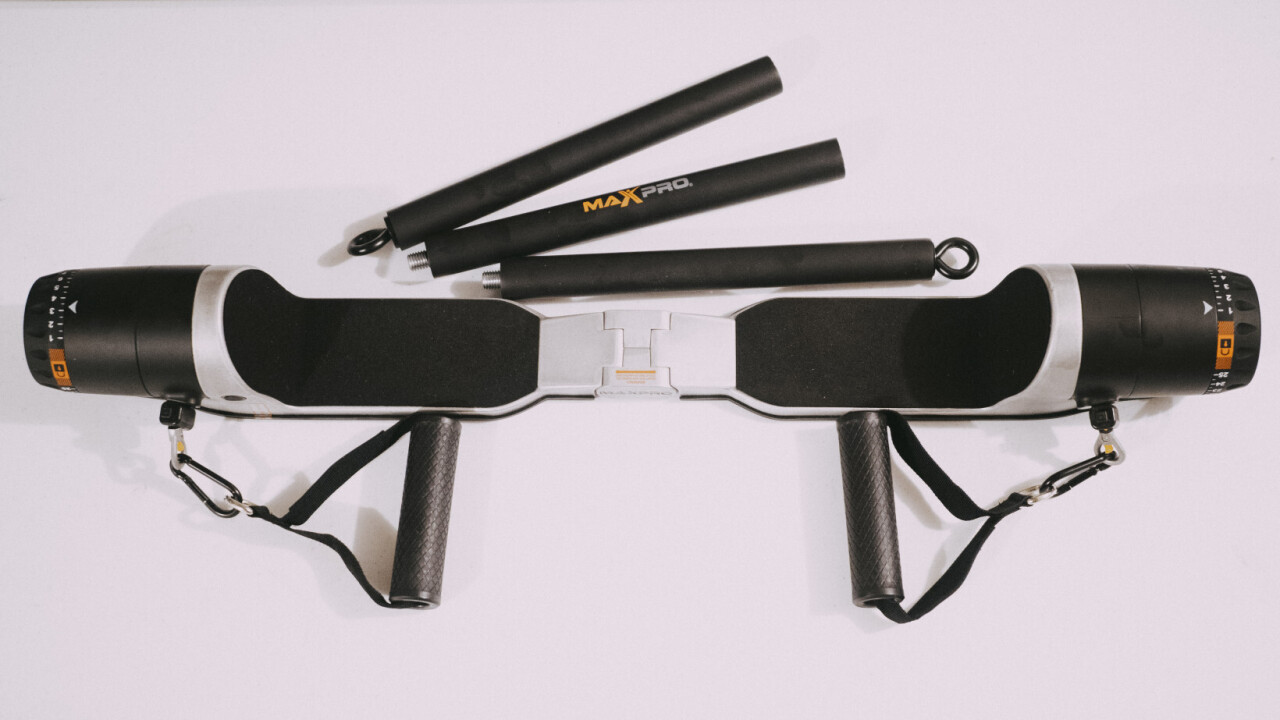
I like working out, but I don’t like the gym. Even before the pandemic made the idea of being stuck in a closed room with sweaty strangers particularly egregious, being stuck in a closed room with sweaty strangers was still not my jam. In an ideal world, I’d be happy with nothing more than a power rack, a bench, a barbell, and some plates. That’s all I really need.
But in a not-ideal small NYC apartment, finding a compact gym system that could actually provide a decent load and that didn’t need to be mounted on a wall has long been a struggle.
The MaxPro fitness machine is one of the closest things I’ve found to a truly compact, all-in-one gym system. It’s basically like the cable machines you’d find in a gym, except the unit folds down small enough to fit in a backpack. It can handle just about any lift, especially with some optional accessories.

It’s so close to being the perfect portable gym, but it also has one very obvious limitation that means it won’t be for everyone, as well as a few other flaws potential buyers should be aware of. But as long as you can live with its limitations, it could be well worth the $749-$849 sticker shock. Though pricey, it could easily pay for itself if it ends up replacing a gym subscription, and its accessibility and flexibility might just bet the ticket to get you to actually, you know, work out.
Here’s how it works for most exercises:
- You unfold the MaxPro and put the unit under your feet. Alternatively, attach it to the door or another sturdy vertical surface with the included mount, put it under the optional bench, or mount it on the optional wall rack.
- You select your grips (the unit ships with a 3-part barbell, 2 handles, and two ankle/wrist straps).
- You set the resistance dials to the appropriate level.
- You lift.
That basically it. No fussing around with switching and layering a bunch of elastic bands if you want to lift heavy, or moving heavy plates or barbells before your next lift. Just step on the machine, set the dials, and start lifting. I the simplicity of the whole thing
The MaxPro claims to provide a little over 300 lbs of resistance (158 lbs per side), and though I wasn’t able to test that with precision, by my estimations based on my typical barbell lifts, that seems to be pretty accurate. Notably, that’s way more than you’d get out of most compact systems, and though some elastic bands can reach those levels of resistance, it usually requires stacking multiple bands and the type of workout you get is different altogether.
That was particularly important for me, as I come from a bit of a powerlifting background. Sure, I can’t hit my one-rep maxes for deadlift or squat with the MaxPro, or make much progress with very low reps, but for the typical 8-12 reps of your average gymgoer, the MaxPro should have the vast majority of users covered.
That brings me to the main limitation of the MaxPro itself: it only provides significant resistance during the concentric portion of the lift. In other words, if you do a biceps curl, it’ll provide resistance on the way up, but very little on the way down (about 5-10lbs). The MaxPro creates resistance via friction, only in one direction.

How much of a “problem” that is is up for debate. Obviously, freeweights and cable machines provide resistance in both directions (thanks, gravity!), so the MaxPro can never fully replicate traditional methods of resistance. In terms of building muscle, some research suggests the eccentric portion of lifts leads to greater muscle growth, which may make you wary of using the MaxPro without some kind of supplementary exercise method.
But these differences are likely very small and can be mitigated with higher workout volume (more reps or more frequent workouts) in a concentric-only system, as you can theoretically recover more quickly by focusing on a concentric-biased workout.
Unsurprisingly, MaxPro touts the limitation as a positive. Per the company’s website, concentric-biased training has the following benefits:
- It’s supposed to be safer because the weight cannot violently drop as with freeweights or elastic bands your (true, I’ve dropped weights on my foot before, it’s not fun).
- Less muscle soreness and fatigue (also true, but if you train more frequently with the MaxPro, that partly evens out).
- Easier to train ‘explosive’ movements like Olympic lifts (kind of, I guess).
- Better at developing Type I muscle fiber growth and endurance qualities (not something I could really test).
- Grows muscle fiber diameter versus length (I didn’t take a sample of my own muscles to test this).
- Muscle growth happens closer to the joint (again not something I could test).
I’ll leave it up to you to decide. Personally, I have no doubt you can build muscle with the MaxPro; ultimately, what matters is that you can lift a higher resistance the next session, and plenty of lifters have had results with concentric-biased exercises long before the MaxPro existed. The MaxPro makes tacking progress a sinch as you can make small adjustments to its resistance dials; you just need to actually write things down to track your progress rather than choosing resistance on a whim.

But my experience is also that getting stronger in one domain doesn’t always fully translate to others; you get stronger at what you train. Ever wonder why the most muscular bodybuilders can’t usually lift as much as a powerlifter? It’s because they don’t train as heavy, but they can also probably pull out more reps.
I don’t like the idea of completely neglecting the eccentric portion of the lift, so I’d want to at least occasionally supplement the lifts with some eccentric motions. That said, I felt I found a good balance by supplementing ‘regular’ lifts with heavier, slow lifts that felt more like isometric exercise. Completely subjectively, that seemed to at least replicate the feeling of the eccentric portion of a lift a bit more.
The other caveat to note is that the MaxPro’s motion isn’t fully smooth out of the box; pulling on the cables feels kind of janky. MaxPro is very upfront about this in the included documentation, and it’s due to the friction mechanism again. It takes about a month of use for it to break in, after which it feels just a little less smooth than your typical cable machine at a gym, but I really wish MaxPro could find a way to break-in the mechanism before it arrives. It doesn’t make for the best first impression.

That’s a shame because the rest of the hardware feels solid. The base itself is made out of sturdy metal and feels like it’ll last. The cables are made out of a material called Dyneema that’s supposed to be 40% stronger than kevlar; I was worried about how thin they are, but they’ve shown no sign of wear over months of use, even though I often used the MaxPro near its resistance limits. That said MaxPro recommends replacing the cables after 1-2 years (about $45 for a pair).
Lastly, it’s 2021, so the unit is naturally available with Bluetooth and an app. This app is better than anticipated for a first-gen product. There are a variety of exercises with videos showing proper form, as well full workouts with coaches. I don’t really enjoy working out alongside videos as I’m good at planning my own workouts, so I just appreciate that the app can track your resistance, reps, and calories burned. There’s also a build-your-own workout mode that you can use to input sets and reps. There aren’t too many frills, but it gets the job done.
A few more miscellaneous notes:
- The optional bench is pretty nice; I just wish you could use the MaxPro with a regular bench. You’d have to do some DIY work to make that happen.
- I do appreciate the concentric-only aspect when doing the bench press. You don’t have to worry about a spotter when going to failure.
- For certain exercises, you’ll have to use a little stopper on the cables to set an adequate range of motion.
- The resistance can be slightly out of sync between the two sides of the unit, but this seems easy enough to calibrate. I did not have this problem with my own unit.
- It’s 2021, so the unit comes with Bluetooth and there are a variety of workouts available in an app. These are fine, but I’m not the type of person that really enjoys lifting alongside a coach, virtual or real, but I appreciate the videos showing how to perform lifts with good form.
- My review unit came in a nifty raw metal colorway, but it comes in orange too, if that’s your jam.
- You won’t be able to set your feet much more than shoulders width apart, so a few exercise variations like a wide stance squat or sumo deadlift are not really feasible.
- I wish the included bar was a simple knurled bar. I’m not a fan of padded bars as they accumulate stench, make grip worse at high resistance, and inevitably the padding starts to come off.
- The markings on the MaxPro’s dials aren’t labeled as pounds or kilos; MaxPro has a conversion guide online, but this really only matters if you want to show off. Otherwise, just increase the dial as you get stronger and keep track of your progress. The universe doesn’t care what units you’re using.
Long story short: the MaxPro only provides concentric resistance and the mechanism feels a little janky for the first few weeks, but the company is upfront about these limitations, and for the most part, it delivers on everything it promises.
Of course, there are cheaper alternatives, and I know what some of you readers are thinking. You can find some dumbbells on craigslist for free and get a full-body workout at home too. Do calisthenics! Heck, I first started lifting years ago with some elastic bands I paid like 30 bucks for and cut down 60 pounds while putting on some muscle. And ultimately, my ideal gym system is still just a good ol’ power rack.
But that’s missing the point. With the MaxPro you’re paying for sheer versatility, both in the exercises you can do and where you’ll be able to do them.
The MaxPro is small enough to fit in a backpack but flexible enough to handle almost every kind of resistance movement, I can think of. For some, that’s worth the price of entry. No, it won’t replace free weights for advanced lifters, but for most people, I think it’s more than enough to replace a gym subscription.
It’s not a perfect system for everyone, but for those looking for an all-in-one workout system that can fit and go virtually anywhere — and as long as you can live with concentric-only workouts — the Max Pro is well worth your consideration.
Get the TNW newsletter
Get the most important tech news in your inbox each week.




